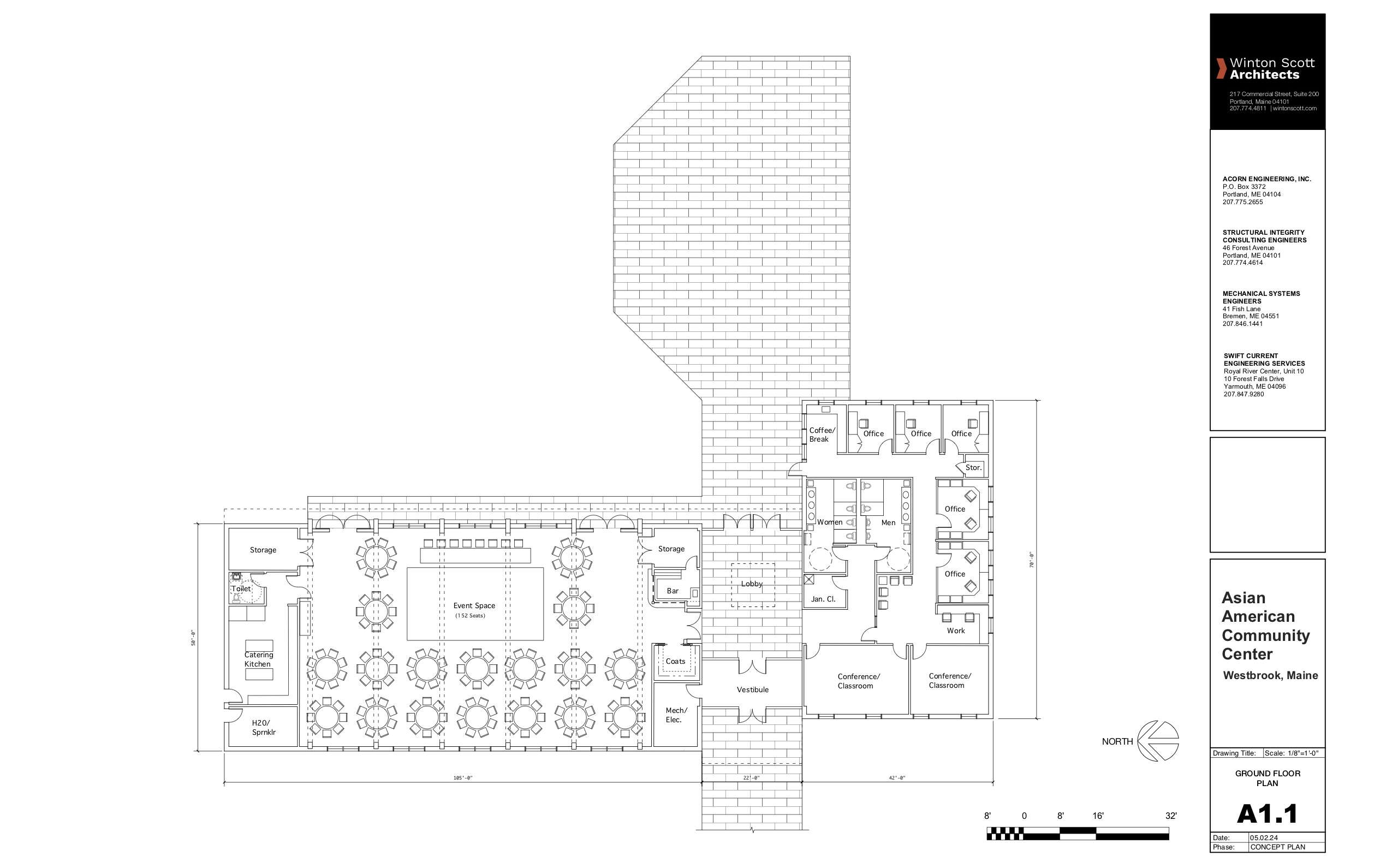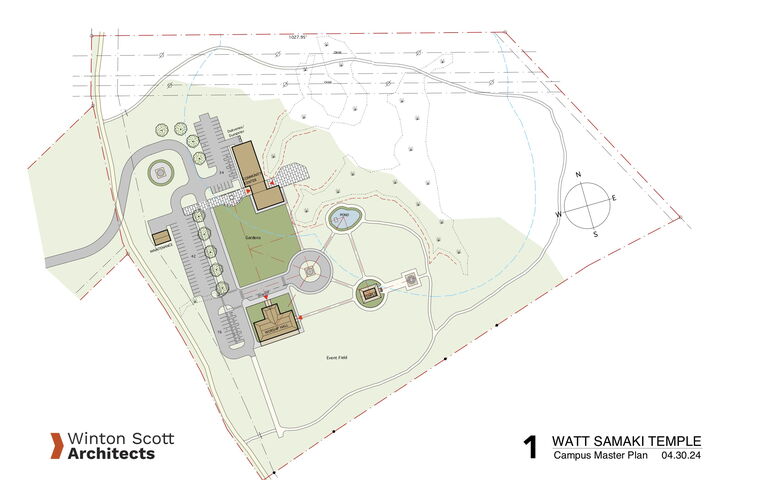
Processing Your Payment
Please do not leave this page until complete. This can take a few moments.
Westbrook may become home to Maine's first center serving Asian-American, Pacific Islander residents
 Courtesy / Winton Scott Architects, Khmer Maine
An initial plan for the overall site, subject to change, shows the community center, temple and quad.
Courtesy / Winton Scott Architects, Khmer Maine
An initial plan for the overall site, subject to change, shows the community center, temple and quad.
A proposal is in the works to create Maine's first community center focused on serving Asian-American and Pacific Islander populations.
The center would be developed in Westbrook by Khmer Maine, a nonprofit that works to improve the social and economic well-being of Cambodians in Maine through cultural exchange, community building and civic engagement. The group also partners to support members of Maine’s Southeast Asian and Pacific Islander communities and strives for solidarity with Black and Indigenous communities.
“Looking forward, as more migration happens, as the communities continue to grow and have families and buy homes and build businesses, an Asian American and Pacific Islander community center made sense,” Marpheen Chann, Khmer Maine’s executive director, told Mainebiz.
Chann was a Mainebiz 40 Under 40 honoree.
The $3.7 million center would be built on a portion of 30 acres of land owned by Watt Samaki, a nonprofit Cambodian Buddhist temple. The parcel is at 00 Cumberland St. in Westbrook. An official street address is pending.
The temple acquired the land last year with the goal to build a new temple, because the community outgrew its current location on 8.6 acres at 128 Back Nippen Road in Buxton.
Development of the temple and the community center is happening concurrently, with an overall site plan expected to go before the Westbrook Planning Board this summer.
Needs assessment
Specific to the center, Khmer Maine is conducting a survey of AAPI organizations, communities and leaders to assess needs that can be met through its creation. Survey results will inform the design.
Through that process, the organization plans to identify prospective tenants and partner organizations that would maximize the benefit of the center to Maine’s AAPI populations.
It’s expected that site and infrastructure planning for both the community center and the temple will begin this summer. Steve Weatherhead of Winton Scott Architects in Portland is the project’s lead architectural consultant. Acorn Engineering is the project’s civil engineering firm.

Construction of the center is expected to begin in the summer of 2025 and to wrap up two years later.
Budget
The budget estimate of $3.7 million includes construction of the center plus roadway, parking, sewage and utility access, public trail access and a contingency fund.
In-kind contributions include Watt Samaki’s permission to use a portion of the 30 acres plus its assistance with the master development plan and civil engineering; along with 100 hours of consultation and design from Weatherhead.
As of February, Khmer Maine had raised $20,000 and received commitments of $100,000 from private individual funders and family foundations.
Additional financing could come from philanthropy, foundations, grants and impact investment loans, said Chann.
The vision for the center is to house organizations valuable to the AAPI Mainers and increase accessibility to legal services, translation, citizenship support and other community resources.
Target population
As of 2022, Maine’s Cambodian community was just over 2,000. In total, Maine’s Asian American and Pacific Islander population numbered over 26,500 people, including those who are multiracial, said Chann.
Since 2000, the AAPI population of Maine has grown by 113%, with the largest population growth focused in Cumberland, York and Penobscot counties.
The growing population of AAPI Mainers “has contributed significantly to the cultural and economic well-being of Maine but also faces significant obstacles to well-being compounded by limited visibility as a community,” according to Khmer Maine.
About a third have limited English proficiency. About 1,000 Asian Americans in Maine lack broadband access, 1 in 10 lack health insurance and 13% live in poverty.
Currently, Maine’s AAPI community is fractured, the organization says. The lack of centralized space and the limited capacity of each AAPI organization make cooperation extremely difficult. The goal of the center is to be a hub for shared resources and the opportunities that come with more synergistic operations. Programs are expected to include:
- Citizenship and immigration support
- Workforce development
- Community navigators, translators, housing assistance, counseling and other social services
- Small-business incubation
- English language classes
- Office, classroom, programming and event infrastructure
- Community garden, kitchen and food pantry
To date, said Chann, Maine’s Asian American and Pacific Islander organizations have been able to operate independently of each other.
But the need for a hub that would bring the populations together became apparent in 2021, he said, when a shooting in Atlanta killed six women of Asian descent.
“It brought our communities together,” he said.
It also highlighted a need for community-building among Asian American and Pacific Island communities.
“We’re stronger together, and we’re more vulnerable when we’re viewed as separate groups,” Chann said.
Design
The design of the center is still on the drawing board. But it’s expected to be close to 9,000 square feet, which will include an event space, office and shared work space, and a classroom. There will be paved terraces and landscaped areas for outdoor events.
Chann credited Weatherhead for working within culturally significant parameters of the project. That includes the design of a quad that separates the community center from the temple, which will be on consecrated land designated as a place for worship in the Buddhist tradition.
“Part of that means that a building like the community center and event space can’t be connected to a place of worship in the Buddhist tradition,” said Chann. “So the quad allows for a community space to co-exist on the same piece of land with the worship hall on its own foundation.”
The temple building and related statuary must be oriented to the east to face the sunrise.
Chann said Khmer Maine and its advisory team expects to meet later this month to review initial sketches and blueprints. The goal is to have materials ready, including an overall site plan that includes the temple, to take to the Westbrook planning board this summer.
Partners
Khmer Maine has a number of partner organizations that have expressed support for the project, including:
- Portland Public Schools Multilingual and Multicultural Center
- Maine Immigrant Rights Coalition
- Greater Portland Council of Governments
- Portland Trails
- Azerbaijan Society of Maine
- New England Arab American Organization
- State Sen. Jill Duson and State Reps. Sue Salisbury and Morgan Rielly
Project leaders are in conversations with additional ethnic community-based organizations:
- Chinese American Friendship Association of Maine
- Filipino American Samahan of Maine
- India Association of Maine
- The Vietnamese community
- The Korean community
The center received a letter of support from former Westbrook Mayor Michael Foley and Acting Mayor David Morse.










0 Comments